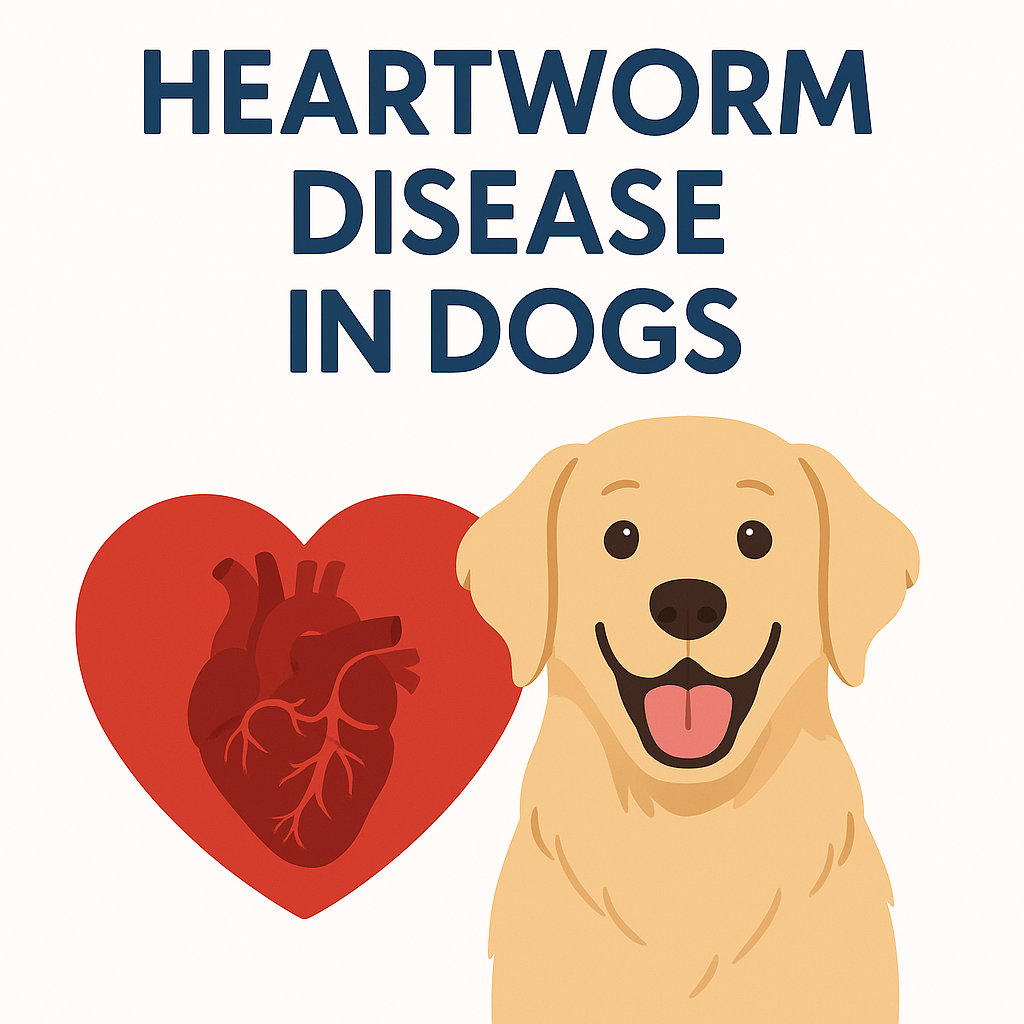
🐶 Heartworm Disease in Dogs – Symptoms, Prevention, and Treatment Guide
Heartworm Disease in Dogs – Symptoms, Prevention, and Treatment Guide
What Is Heartworm Disease in Dogs?
Heartworm disease is a serious and potentially fatal condition caused by parasitic worms living in the heart, lungs, and associated blood vessels of infected dogs.
It is transmitted through mosquito bites, and without timely treatment, it can lead to severe lung disease, heart failure, and death.
Prevention is much easier, safer, and more cost-effective than treatment.
Regular health management is critical to protecting your dog’s life.
🚨 Main Symptoms of Heartworm Disease in Dogs
-
Persistent coughing (often worse after exercise)
-
Fatigue and reduced activity levels
-
Difficulty breathing
-
Loss of appetite and weight loss
-
Swollen abdomen (due to fluid buildup)
-
In severe cases: heart failure, collapse, or sudden death
⚠️ Many dogs show no obvious symptoms early on, making regular screening vital.
🦟 How Dogs Become Infected with Heartworms
-
Dogs become infected when bitten by a mosquito carrying heartworm larvae.
-
The larvae migrate through the body, maturing over 6 months into adult worms that lodge in the heart and pulmonary arteries.
-
As the infestation grows, it can cause severe damage to major organs and eventually lead to heart failure.
🛡️ How to Prevent Heartworm Disease
1. Monthly Heartworm Preventatives
-
Available as topical treatments, oral medications, or annual injections
-
These medications eliminate early-stage larvae before they can mature
2. Annual Heartworm Testing
-
Blood antigen tests detect heartworm infection early
-
Annual screening is crucial even if your dog is on prevention
3. Mosquito Control
-
Use mosquito screens and repellents
-
Avoid walks during peak mosquito hours (dawn and dusk)
💉 Treatment Options for Heartworm Disease
If your dog tests positive for heartworms, veterinary intervention is essential:
-
Medication therapy: Deep intramuscular injections (e.g., melarsomine) to kill adult worms
-
Activity restriction: Strict rest to minimize stress on the heart during treatment
-
Supportive care: Antibiotics and anti-inflammatory medications to manage complications
⚠️ In severe cases, surgical removal of worms may be necessary.
🛒 Recommended Products for Heartworm Prevention
-
Monthly heartworm preventatives (oral/topical)
-
Annual heartworm preventative injections
-
Mosquito repellents and control products
👉 Explore our Dog Heartworm Prevention Collection
External Resource (DoFollow)
For more detailed information, visit the American Heartworm Society – Canine Heartworm Disease.
Internal Resource
👉 Related article: Dog Health Care and Vaccination Schedule
🧩 Frequently Asked Questions (FAQ)
Q1. Is missing one or two months of heartworm prevention dangerous?
A1. Yes, heartworm infection can occur from a single mosquito bite.
Monthly preventatives must be administered consistently to be effective.
Q2. How can I confirm if my dog has heartworm disease?
A2. A blood antigen test is used to detect heartworm infections.
Veterinarians recommend annual screening, even for dogs on preventatives.
Q3. My dog lives indoors. Does it still need heartworm prevention?
A3. Yes. Mosquitoes can enter homes through windows and doors,
so even indoor dogs must be on heartworm prevention year-round.
⚠️ What to Do If You Suspect Heartworm Disease in Your Dog
If you notice signs that may indicate heartworm disease in dogs, early action is essential. Here’s what to do step by step:
✅ 1. Do Not Panic — Stay Calm and Observant
-
Monitor your dog’s breathing, energy level, and eating habits
-
Note any persistent coughing, fatigue, or abdominal swelling
✅ 2. Avoid Strenuous Activity
-
Do not let your dog run, play, or exercise excessively
-
Increased activity can accelerate heart damage if worms are present in the heart or lungs
✅ 3. Schedule a Vet Visit Immediately
-
Inform the vet of your concerns and request a heartworm antigen test
-
Bring any records of missed preventatives or recent symptoms
✅ 4. Do Not Administer Any Heartworm Medication on Your Own
-
Preventatives given to already-infected dogs can cause complications
-
Wait until the vet confirms diagnosis and recommends a safe treatment plan
✅ 5. Follow Your Vet’s Instructions Closely
-
If diagnosed, your dog will need a customized treatment plan that may include
-
restricted activity
-
anti-inflammatories
-
antibiotics
-
heartworm-specific injections
-
✅ 6. Limit Stress and Keep Environment Stable
-
Provide a quiet resting area
-
Avoid changes in routine or stressful stimuli during evaluation and treatment
🐾 Reminder: Prevention Is Always Easier Than Treatment
Heartworm disease is a serious condition, but it is almost entirely preventable with year-round care.
Even if your dog appears healthy, annual screening + consistent preventatives are critical to early detection and peace of mind.

